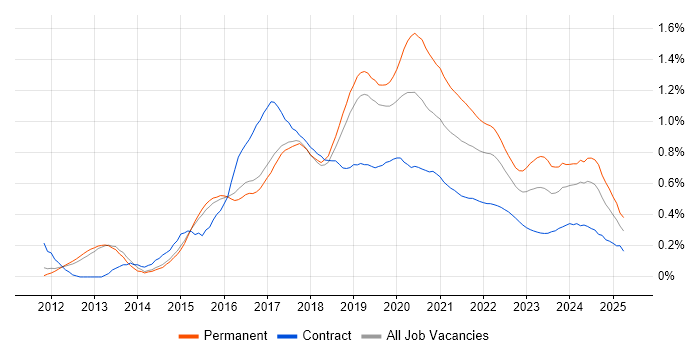Pivotal Software RabbitMQ
UK > Work from Home
The table below provides summary statistics and salary benchmarking for remote or hybrid work requiring RabbitMQ skills. It covers permanent job vacancies from the 6 months leading up to 5 March 2026, with comparisons to the same periods in the previous two years.
| 6 months to 5 Mar 2026 |
Same period 2025 | Same period 2024 | |
|---|---|---|---|
| Rank | 338 | 308 | 429 |
| Rank change year-on-year | -30 | +121 | -5 |
| Permanent jobs citing RabbitMQ | 47 | 107 | 121 |
| As % of all permanent jobs with remote/hybrid work options | 0.28% | 0.74% | 0.43% |
| As % of the Libraries, Frameworks & Software Standards category | 1.58% | 2.30% | 1.47% |
| Number of salaries quoted | 39 | 76 | 113 |
| 10th Percentile | £58,000 | £51,250 | £48,750 |
| 25th Percentile | £63,750 | £57,500 | £55,000 |
| Median annual salary (50th Percentile) | £77,500 | £67,500 | £67,500 |
| Median % change year-on-year | +14.81% | - | -3.57% |
| 75th Percentile | £100,000 | £80,313 | £83,750 |
| 90th Percentile | £105,500 | £87,500 | £94,750 |
| UK median annual salary | £83,750 | £67,500 | £65,000 |
| % change year-on-year | +24.07% | +3.85% | -7.14% |
All Software Libraries and Frameworks
Work from Home
RabbitMQ falls under the Software Libraries and Frameworks category. For comparison with the information above, the following table provides summary statistics for all permanent job vacancies with remote or hybrid options requiring technical specification, industry standards, software libraries and framework skills.
| Permanent vacancies with a requirement for technical specification, industry standards, software libraries and framework skills | 2,972 | 4,645 | 8,228 |
| As % of all permanent jobs with a WFH option | 17.80% | 32.00% | 28.97% |
| Number of salaries quoted | 2,183 | 3,202 | 7,138 |
| 10th Percentile | £42,500 | £41,250 | £40,000 |
| 25th Percentile | £52,500 | £52,000 | £47,500 |
| Median annual salary (50th Percentile) | £67,500 | £66,295 | £60,000 |
| Median % change year-on-year | +1.82% | +10.49% | -7.69% |
| 75th Percentile | £85,000 | £85,000 | £80,000 |
| 90th Percentile | £105,000 | £110,000 | £97,500 |
| UK median annual salary | £65,000 | £66,219 | £60,000 |
| % change year-on-year | -1.84% | +10.37% | -11.11% |
RabbitMQ
Job Vacancy Trend for Remote/Hybrid Jobs
Historical trend showing the proportion of permanent IT job postings citing RabbitMQ and offering remote or hybrid work options relative to all permanent IT jobs advertised.

RabbitMQ
Salary Trend for Remote/Hybrid Jobs
Salary distribution trend for jobs with remote/hybrid work options citing RabbitMQ.

RabbitMQ
Salary Histogram for Remote/Hybrid Jobs
Salary distribution for jobs with remote/hybrid work options citing RabbitMQ over the 6 months to 5 March 2026.
RabbitMQ
Co-Occurring Skills & Capabilities in Remote/Hybrid Jobs by Category
The following tables expand on the one above by listing co-occurrences grouped by category. They cover the same employment type, locality and period, with up to 20 co-occurrences shown in each category:
|
|
||||||||||||||||||||||||||||||||||||||||||||||||||||||||||||||||||||||||||||||||||||||||||||||||||||||||||||||||||||||||||||||
|
|
||||||||||||||||||||||||||||||||||||||||||||||||||||||||||||||||||||||||||||||||||||||||||||||||||||||||||||||||||||||||||||||
|
|
||||||||||||||||||||||||||||||||||||||||||||||||||||||||||||||||||||||||||||||||||||||||||||||||||||||||||||||||||||||||||||||
|
|
||||||||||||||||||||||||||||||||||||||||||||||||||||||||||||||||||||||||||||||||||||||||||||||||||||||||||||||||||||||||||||||
|
|
||||||||||||||||||||||||||||||||||||||||||||||||||||||||||||||||||||||||||||||||||||||||||||||||||||||||||||||||||||||||||||||
|
|
||||||||||||||||||||||||||||||||||||||||||||||||||||||||||||||||||||||||||||||||||||||||||||||||||||||||||||||||||||||||||||||
|
|
||||||||||||||||||||||||||||||||||||||||||||||||||||||||||||||||||||||||||||||||||||||||||||||||||||||||||||||||||||||||||||||
|
|
||||||||||||||||||||||||||||||||||||||||||||||||||||||||||||||||||||||||||||||||||||||||||||||||||||||||||||||||||||||||||||||
|
|||||||||||||||||||||||||||||||||||||||||||||||||||||||||||||||||||||||||||||||||||||||||||||||||||||||||||||||||||||||||||||||
